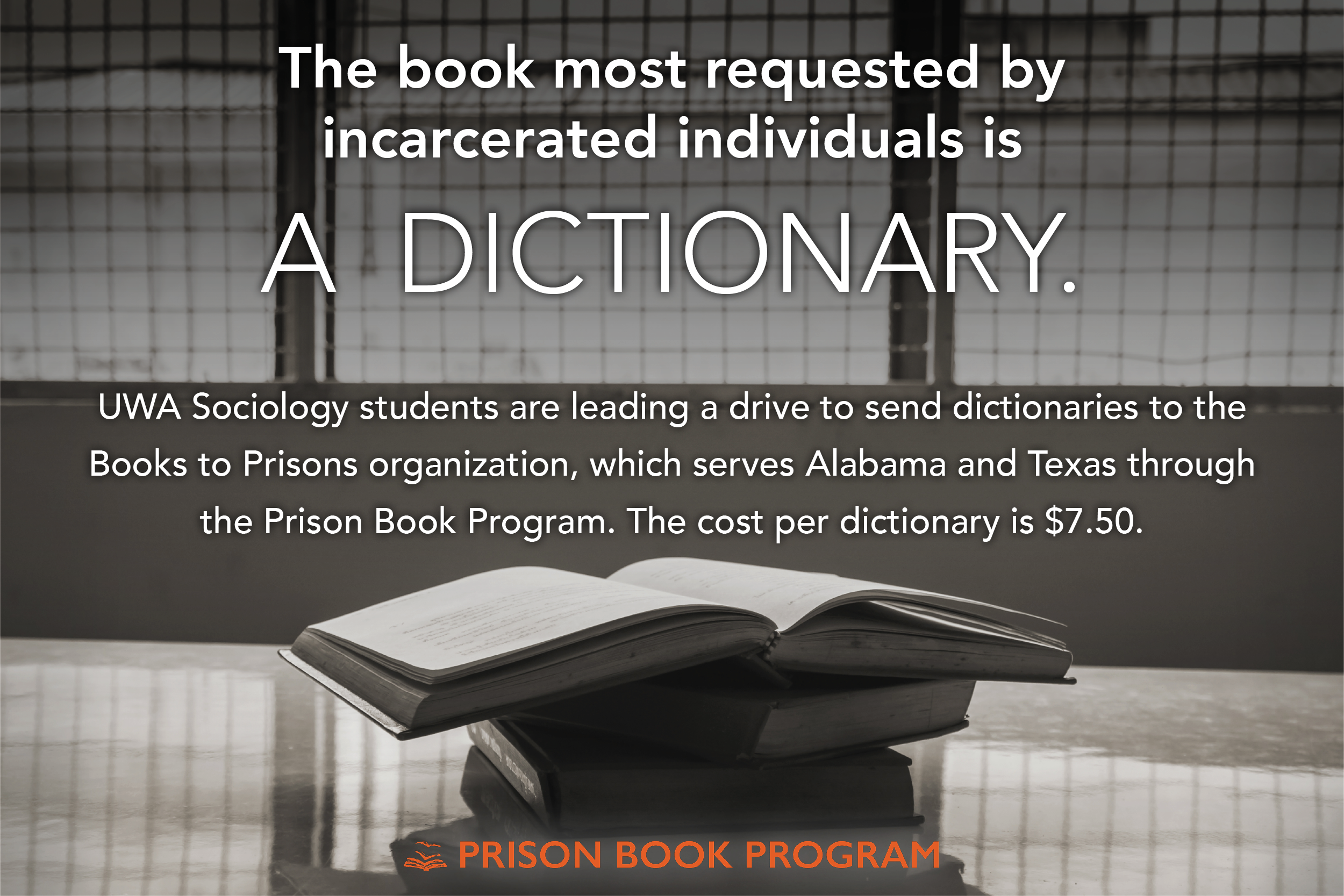
Amelia Vazquez, a sociology major at UWA, plays for the women’s soccer team.
Dr. Russ Davis is leading university’s Books to Prisons effort
Story: Phillip Tutor | Photo: Jordan Allison
There’s a simple, if not noble, reason why Amelia Vazquez chose to study sociology and criminal justice at the University of West Alabama.
“I’ve always had a desire to help people, and the criminal justice system has always fascinated me,” she said. “I thought about going into Emergency Medical Services as my original major, but this has grown very strongly on me.”
That passion is also why Vazquez is among the students helping Dr. Russ Davis, an assistant professor of sociology at UWA, with a program designed to help a Birmingham-based nonprofit deliver books to inmates in the Alabama Department of Corrections.
The nonprofit, Books to Prisons, is affiliated with a similar program in Washington, D.C. The Birmingham nonprofit, first organized in 2009, partners with the Canterbury United Methodist Church, where the donated books are warehoused before being sorted and mailed to prisons in Alabama and Texas.
UWA’s Books to Prison effort features two components. This week, Davis and UWA students have placed collection boxes in most campus buildings for donations of unwanted books. Most prison systems prohibit book donations that include sexual content, violence or true crime stories. But a wide range of topics are generally allowed, Davis said — novels, nonfiction, bibles and textbooks. Business-related texts are popular. So, too, are western-themed novels such as those by author Louis L’Amour.
Concurrently, UWA’s effort also addresses what Books for Prisons administrators say is among inmates’ top book requests — dictionaries. To support the drive, people can donate in increments of $7.50 that will be used to buy a new dictionary for inmates. Funds are being collected through a special account in the UWA Foundation, which is a 501(c)(3) organization, and contributions to it are tax-deductible.

Donated books that don’t meet prison guidelines will be sold to a used bookstore in Birmingham, and proceeds will be used to purchase dictionaries.
“We know the students are going to be moving out of the dorms real soon,” Davis said, “and anything and everything they’ve got in their rooms that they don’t want to cart home, book-wise, we’d be more than happy to pick up and take from them.”
Davis first met administrators from Books to Prisons before the Covid-19 pandemic and explored ways to participate. The dictionary requests stunned him. Inmates’ needs for appropriate books didn’t. As a sociology professor with passions similar to Vazquez’s, he knew the interest from segments of UWA’s student body would be keen.
“I was just thrilled to get to meet them,” he said. “We have the largest prison population in the entire developed world, and it’s our response to nearly all of our social problems to simply lock people up. Knowing there are these groups out there trying to meet that need (for books) was marvelous.”
More than half of incarcerated people are re-incarcerated within about three years, Davis said, many of whom lack certain skills needed for employment and don’t have access to adequate prison libraries. Inmates’ reading requests also pair well with his students’ needs.
“Like most programs, we’re trying to build up (our students’) resumes and vitas and get them some experience in community service,” he said. Vazquez, a junior from Parrish, Florida, and a member of the UWA women’s soccer team, provides the perfect example. “She was asking about something that we could possibly do within the program to meet all those needs. And I’m like, ‘I have the perfect idea just waiting for you.’”
She didn’t hesitate to join the project.
“As a society, we have a negative outlook on prisoners in general,” Vazquez said. “I think the fact that they just want a dictionary, such a simple book to read, and to learn more words speaks about who they are as people. They deserve more than what’s given throughout the prison system and justice system in general.”
Davis doesn’t expect UWA’s first Books to Prisons project to be a one-off effort.
“I absolutely would love to make it an annual event,” he said, “because the problem is definitely not going away anytime soon.”